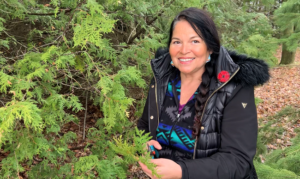Lakehead University celebrates Treaties Recognition week through education

By Rick Garrick
CHIPPEWAS OF GEORGINA ISLAND — Chippewas of Georgina Island’s Elder Shelley MandawKwe Charles and Cynthia Wesley-Esquimaux recently spoke about the Clan System and treaty relationships during Lakehead University’s Treaties Recognition Week virtual presentations.
Charles delivered a Nov. 3 presentation on Our Language is Written on the Land and Wesley-Esquimaux delivered a Nov. 6 presentation on What Treaties and Right Relations Offer Canadians.
“For my presentation, I was talking more about our individual identities, our community identity and our extended relationships to other communities through the Clan System,” Charles says. “For example, if I’m a fish clan member from Georgina Island, I would also be directly related to another fish clan member from [another community]. So part of talking about the relationship was also to help illustrate the connection and what extended family means from an Indigenous perspective.”
Charles says there was “some really good feedback” from the participants during and after her virtual presentation.
“People had reached out wanting to know more about the Clan System and wanting to know more about the relationship with water and all sorts of things,” Charles says. “So it was a pretty positive presentation.”
Charles says it was important to look at reconciliation and education as reconciliation during the celebration and recognition of Treaties Recognition Week.
“For me personally, anytime there is an opportunity to share Indigenous knowledge and teachings with people, I think that is really important because it brings us together on so many levels,” Charles says. “It also widens our circle and it increases our knowledge and sharing opportunities.”
Wesley-Esquimaux, chair on reconciliation at Lakehead University, says her presentation included a look at historic treaties, including concerns about the taking-up clause and the protection of lands and waters, as well as some of the modern treaties, such as in B.C., northern Quebec and Nunavut.
“I talked a little about the numbered treaties and suggested they look at Alexander Morris’s work [he was involved in negotiating treaties 3, 4, 5 and 6] and not just the treaty documents themselves but at the commissioner’s letters and notes which is where most of the conversation was around what was being promised in the treaty,” Wesley-Esquimaux says. “I talked about the Williams Treaty and some of the treaties in the southern territory where I live and how there were some shady dealings, and those eventually became land claims which were more recently resolved like the Coldwater [claim for $307 million] and the Williams treaty in 2018 for $1.1 billion.”
Wesley-Esquimaux also talked about the attacks against Indigenous lobster fishers in Nova Scotia and other backlashes against First Nation citizens who were expressing their treaty or Aboriginal rights in Canada as well as the United Nations Declaration on the Rights of Indigenous Peoples and the duty to consult and accommodate.
“I talked about a lot of different things to give them an understanding that the treaties have not gone away, they’re still there,” Wesley-Esquimaux says. “They’re still viable agreements, nation-to-nation contracts and they are being fulfilled in a variety of ways across the country, and I showed them different kinds of maps to illustrate that for them.”
Lakehead University’s Treaties Recognition Week also featured virtual presentations on Solidarity with the Mi’kmaq – Is the Crown at War with us?; Díi Hlanggwáay tla k_íiya ‘la áaygaagang: Fostering Inclusive Research and Education Practices From K-12 to Funding Agencies; and An Introduction to Crown-Indigenous Treaties and Treaty Law in Canada.

